 'Jin' named the word of the year by cross-strait netizens
'Jin' named the word of the year by cross-strait netizens Chinese scientific expedition goes to build new Antarctica station
Chinese scientific expedition goes to build new Antarctica station
 Chinese naval escort fleet conducts replenishment in Indian Ocean
Chinese naval escort fleet conducts replenishment in Indian Ocean 17th joint patrol of Mekong River to start
17th joint patrol of Mekong River to start China's moon rover, lander photograph each other
China's moon rover, lander photograph each other Teaming up against polluters
Teaming up against polluters
The Travels of Marco Polo was the first works through which westerners gained a glimpse into the remote east. For the occidental readers, the author Marco Polo opened up the door to the mysterious China and the whole oriental world. Westerners' first knowledge about Xiangyang, the magic city in China, was derived from the widely-read travel notes as well. The Travels of Marco Polo was the first works through which westerners gained a glimpse into the remote east. For the occidental readers, author Marco Polo opened up the door to the mysterious China and the whole oriental world. Westerners' first knowledge about Xiangyang, the magic city in China, was derived from the widely-read travel notes as well.
We can know from the travel notes that Marco Polo was quite familiar with Xiangyang and he definitely had been to Xiangyang during the period from the 4th Year (1268) to the first lunar month of the 9th Year (1273) under the reign of Xianchun Emperor of the Southern Song Dynasty when Xiangyang Prefecture and Fan Prefecture (the predecessor of today's Xiangyang City) were under wars perpetrated by the ruling Song Dynasty and the rebelling force which later foundered Yuan Dynasty. In the near 1,000 words of paragraph, which was titled "Xiangyang Prefecture" and under the second volume dedicated to "Mangi Province", Marco Polo tersely recorded the affluence and prosperity of Xiangyang Prefecture and then elaborated on wars taken place here with detailed descriptions like that "Xiangyang Prefecture is one major prefecture of Mangi Province and governs 12 big market towns in judicial regime". "As one significant commercial hub", "its raw silk output is quite impressive. The most exquisite silk fabrics waved by gold thread are also originated from Xiangyang Prefecture. It is also a place with various games on sales. In short, all things you expect to come across in big city can be found here in sufficient quantity. All these facts explain why its resistance against invaders is so formidable – it has endured besiege for three years before Mangi Province was usurped by Kublai Khan. Even so, it still refused to surrender to the army led by Kublai." What's followed behind is the description for then Xiangyang Prefecture: "This prefecture is circled by water from three sides, and only its northern side is connected to land. This makes this prefecture comfortably invincible except of its northern side where the invading force could try to approach to city wall."
Marco Polo continued to narrate that the formidable invading army swept across the whole country without any hindrance since many cities optioned to surrender without any resistance. Xiangyang, the only reception, was relentlessly fighting against the invaders, which made Kublai Khan very sad in heart.
Stephen Owen, the famous sinologist in Harvard University, included his monograph about Yang Hu, an official in Mountain Xian Region in Xiangyang, in his book Reminiscence.
"Among the similar settings, Tear-shedding Stele in Mountain Xian is the most eye-catching establishment. It was erected by local Xiangyang people in the commemoration of Yang Hu, a local official, in the middle of the third century." "The stele in honor of Yang Hu has become such an indispensable part of Mountain Xian that, the stele has become the synonyms for Mountain Xian to many locals."
Japanese's fondness towards the sentimental poem of The Night of Maple-Bridge written by Zhang Ji, the famed Xiangyang-origin poet in Tang Dynasty (618-907), gives rise to their hobby of staying at Hanshan Temple of Jiangsu Province to hear the bell rings here in the serene midnight.
Also in Korea, there is also a river called Han River and a prefecture called Xiangyang.
Xiangyang also has its influence spread to places like the Middle East, where one kind of oil paint is termed as Xiangyang, named after the original place it was introduced from back in Tang Dynasty.
Xiangyang-origin Jingxiang Tea has found its way to Russian market since Tang Dynasty.
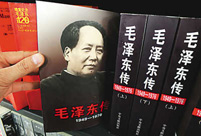 Commemorate 120th birth anniversary of Mao Zedong
Commemorate 120th birth anniversary of Mao Zedong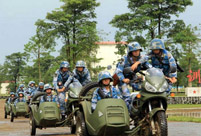 Female soldiers of PLA Marine Corps in training
Female soldiers of PLA Marine Corps in training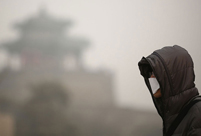 Chinese cities to have a very grey Christmas as smog persists
Chinese cities to have a very grey Christmas as smog persists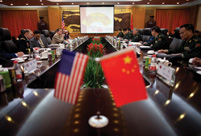 China and U.S. - the national image in each other’s eyes
China and U.S. - the national image in each other’s eyes The Liaoning's combat capability tested in sea trial
The Liaoning's combat capability tested in sea trial Chinese pole dancing team show their moves in snow
Chinese pole dancing team show their moves in snow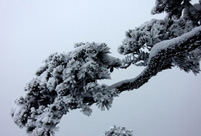 Rime scenery in Mount Huangshan
Rime scenery in Mount Huangshan Ronnie O'Sullivan: My children mean the world to me
Ronnie O'Sullivan: My children mean the world to me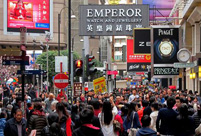 Shopping in Hong Kong: a different picture
Shopping in Hong Kong: a different picture SWAT conducts anti-terror raid drill
SWAT conducts anti-terror raid drill AK-47 inventor dies at 94
AK-47 inventor dies at 94 Mother practices Taiji with her son
Mother practices Taiji with her son  Crashed French helicopter salvaged
Crashed French helicopter salvaged Winter travels in Anhui
Winter travels in Anhui  Bird show opens to public in Calcutta, India
Bird show opens to public in Calcutta, IndiaDay|Week|Month